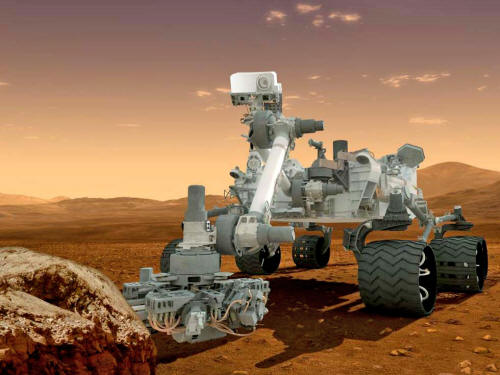|
November 24, 2012 from Examiner Website
Artistic depiction of NASA Mars Science Laboratory Curiosity rover, a nuclear-powered mobile robot for investigating Mars past or present ability to sustain microbial life. CREDIT: NASA/JPL-Caltech
NASA is about to make a big announcement from its Curiosity Rover Mars mission according to John Grotzinger, its principal investigator. Will it be a giant leap forward in the search for life on Mars?
Speculation began soon after Grotzinger gave an interview on NPR public radio on November 20 where he said:
In the NPR interview, Grotzinger said it would be several weeks before his team would announce their finding.
A clue as to what was discovered is that the data comes from Curiosity's Sample Analysis at Mars instrument - basically an onboard chemistry lab that is capable of identifying organic compounds - the carbon-containing building blocks of life as we know it.
While organic compounds do not necessarily mean that life exists/existed on Mars, they are a vital ingredient in the formation of life. NASA’s big upcoming announcement is most likely to be that it has discovered organic compounds on Mars - possibly, the fossilized remains of ancient Martian microbes.
NASA has been here before. In August 1996, David McKay and a team of NASA scientists published their analysis of a Martian meteorite discovered in Antarctica.
The meteorite was found to have carbon compounds that looked very much like fossil remains of ancient Martian microbes.
Here is how Mackay explained their findings:
The announcement was big news at the time, and led to President Clinton making a statement:
President Clinton Statement on Martian meteorite and fossil microbes
The 1996 discovery then got bogged down in scientific debate over whether or not the meteorite was polluted by Earth microbes. Critics claimed NASA scientists had not sufficiently accounted for this possibility.
Not so according to a new 2009 study by NASA scientists, including McKay, from the Johnson Space Center that upheld the earlier findings and concluded:
The continuing debate over the 1996 Mars meteorite has led to Grotzinger and his team taking a cautious approach to announcing the results of their analysis of the data sent back by Curiosity’s SAM instrument.
If, as Grotnzinger suggests, the results are upheld, we will soon hear that organic compounds have been found on Mars. More importantly, they might be the fossil remnants of ancient microbiological life.
You can then expect President Obama following in the footsteps of President Clinton, and make his own public announcement concerning the implications of ancient life on Mars.
|

